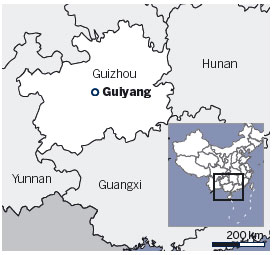Overseas returnee feeds burning desire in niche industry
|
The Guiyang Olympic Sports Center is a major sports venue in the province that was completed in 2010. |
Where is the best place for a talented Chinese youngster with a Western education to start his or her career?
Some would say in the big cities of China or at a Fortune 500 firm in a foreign country.
But in Guiyang, a mountainous city of Southwest China's Guizhou province, young entrepreneurs are answering that question differently.
"Being a boss on your own is way harder than it sounds," said 35-year-old Yu Guo in an office building in Guiyang's high-tech district.
Born and raised in Guiyang, Yu garnered the top score in gaokao, China's national college exam, and was selected by Tsinghua University, one of China's most prestigious, in 1999.
After getting his bachelor's and master's degrees in environmental sciences at Tsinghua and the Chinese Academy of Sciences, Yu received a full scholarship from the University of Illinois in 2006. He earned his doctorate in 2012 in agriculture and biological engineering.
He then found an engineering job at an automobile company in Chicago testing ways to reduce emissions in automobiles.
"It was a decent job, but I felt my career belonged in my hometown in China," Yu recalled.

During his brief career in the United States, Yu and his colleagues discovered a way to extract organic residue out of distillers' grains, a byproduct of whiskey and fuel ethanol production, which could be used as fodder in the animal husbandry industry.
Guizhou is known for its distilleries and liquor industry, including Moutai, China's national liquor. As a native of the province, Yu sees a potential opportunity for the organic residue in his hometown.
"Liquor is one of the largest industries in Guizhou and there is much solid waste and distillery residue produced every day," said Yu, who quickly set upon the goal of producing and developing animal feed with his partners.
"The primary ingredient for Chinese liquor is corn, which is also the main ingredient for feed that heavily relies on imports from China," Yu said.
In order to perfect the feed product, Yu invited schoolmates from both Tsinghua and the University of Illinois to join his research team.
Unlike working for someone else, he said, "running a company on your own is way harder since you have to consider everything from bottom to top".
To secure more funding, Yu registered a company in the US hoping to attract more technical support and investors. After months of preparation, Yu's company in Guiyang now has six regular employees who are in charge of marketing, financing and public relations.
He plans to establish research and development centers in both Guiyang and Chicago.

Though money is still the top concern for the company, faith and determination are Yu's driving forces.
Cities in the province are promising places for young people to chase their dreams, said Yu. He added that to help young people like him succeed, local governments need to issue policies and build platforms for small companies to expand their businesses.
Since 2013, both provincial and municipal governments have offered a batch of favorable policies to support startups.
"It's a double joy when you achieve career success and do something good for your hometown at the same time," Yu said.
Preferential policies
Since 2013 the provincial government has offered a batch of favorable policies to support startups in the high-tech sector.
The government announced it would offer 200 million yuan ($32.2 million) to lure top-level personnel to the province every year from 2013.
Preferential policies in fundraising, housing and tax are also provided.
Contact the writers at yangjun@chinadaily.com.cn
(China Daily 07/28/2015 page24)















